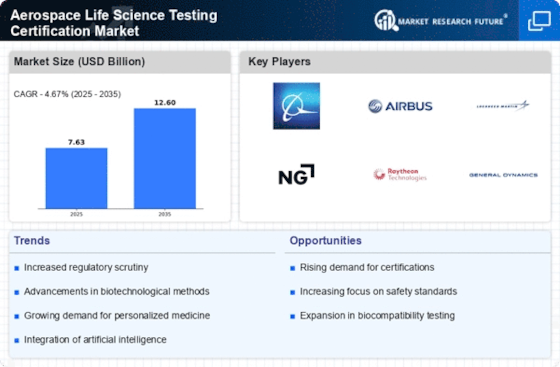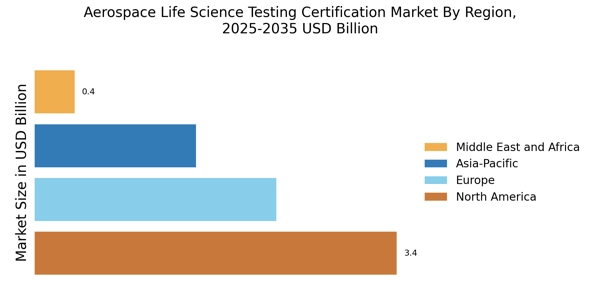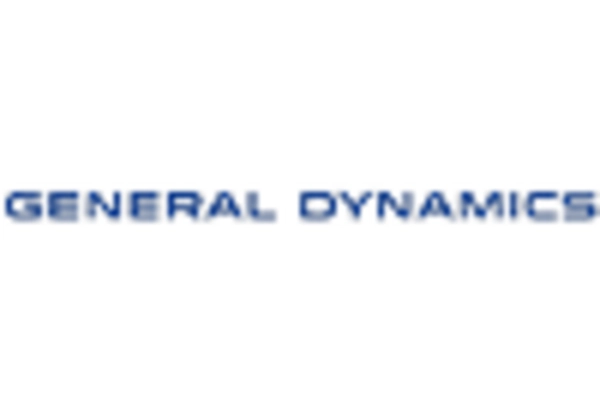Focus on Sustainability
The Aerospace Life Science Testing Certification Market is increasingly influenced by a focus on sustainability. As environmental concerns gain prominence, companies are seeking to develop eco-friendly testing methods and materials. This shift is reflected in the adoption of sustainable practices throughout the certification process, including the use of biodegradable materials and energy-efficient testing equipment. The market is projected to expand by approximately 5% as organizations align their operations with sustainability goals. This trend not only addresses environmental challenges but also enhances brand reputation, as consumers and stakeholders favor companies committed to sustainable practices. Thus, the emphasis on sustainability is reshaping the landscape of aerospace life science testing certification.
Increased Regulatory Scrutiny
The Aerospace Life Science Testing Certification Market is currently facing heightened regulatory scrutiny, which is compelling organizations to prioritize compliance. Regulatory bodies are implementing more rigorous testing standards to ensure safety and efficacy in aerospace applications. This increased oversight is evident in the introduction of new guidelines that mandate comprehensive testing protocols for life science products used in aerospace. Consequently, companies are investing significantly in certification processes to avoid penalties and ensure market access. The market is expected to witness a growth rate of around 6% as organizations adapt to these evolving regulations. This trend underscores the importance of maintaining high standards in testing and certification to meet both regulatory and consumer expectations.
Technological Advancements in Testing
The Aerospace Life Science Testing Certification Market is experiencing a surge in technological advancements that enhance testing methodologies. Innovations such as automated testing systems and advanced data analytics are streamlining processes, thereby improving accuracy and efficiency. For instance, the integration of artificial intelligence in testing protocols allows for real-time data analysis, which is crucial for timely decision-making. As a result, organizations are increasingly adopting these technologies to meet stringent certification requirements. The market is projected to grow at a compound annual growth rate of approximately 7% over the next five years, driven by these advancements. This trend not only facilitates compliance with regulatory standards but also enhances the overall quality of aerospace life science products.
Growing Demand for Aerospace Innovations
The Aerospace Life Science Testing Certification Market is witnessing a growing demand for innovative aerospace technologies. As the aerospace sector evolves, there is an increasing need for advanced life science products that require rigorous testing and certification. This demand is driven by the pursuit of enhanced performance, safety, and reliability in aerospace applications. The market is anticipated to grow at a rate of 6.5% as companies strive to meet the needs of an evolving industry. This trend necessitates the development of comprehensive testing protocols that ensure compliance with certification standards, thereby fostering innovation while maintaining safety. The interplay between innovation and certification is crucial for the advancement of aerospace life science technologies.
Rising Investment in Research and Development
The Aerospace Life Science Testing Certification Market is benefiting from rising investments in research and development (R&D). Organizations are increasingly allocating resources to R&D initiatives aimed at developing new testing methodologies and improving existing certification processes. This investment is essential for keeping pace with technological advancements and regulatory changes. The market is projected to grow by approximately 7% as companies seek to enhance their testing capabilities through innovative R&D efforts. This trend not only fosters the development of cutting-edge testing solutions but also ensures that organizations remain competitive in a rapidly evolving landscape. The emphasis on R&D is pivotal for the continuous improvement of aerospace life science testing certification.

















